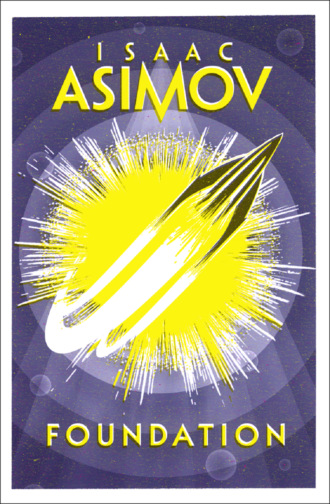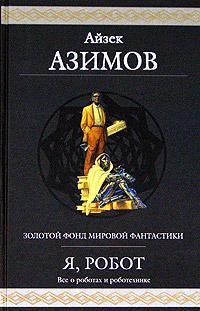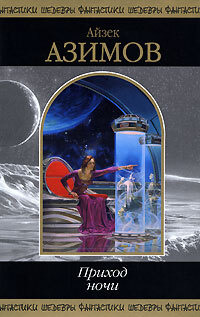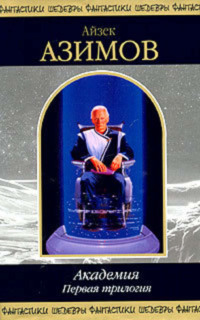
Полная версия
Foundation



Copyright
HarperVoyager
An imprint of HarperCollinsPublishers Ltd
1 London Bridge Street
London SE1 9GF
www.harpercollins.co.uk
First published in Great Britain by Weidenfeld & Nicolson 1953
Copyright © Isaac Asimov 1951
Cover design and illustration by Mike Topping © HarperCollinsPublishers Ltd 2016
Isaac Asimov asserts the moral right to be identified as the author of this work.
A catalogue copy of this book is available from the British Library.
This novel is entirely a work of fiction. The names, characters and incidents portrayed in it are the work of the author’s imagination. Any resemblance to actual persons, living or dead, events or localities is entirely coincidental.
All rights reserved under International and Pan-American Copyright Conventions. By payment of the required fees, you have been granted the non-exclusive, non-transferable right to access and read the text of this e-book on screen. No part of this text may be reproduced, transmitted, down-loaded, decompiled, reverse engineered, or stored in or introduced into any information storage and retrieval system, in any form or by any means, whether electronic or mechanical, now known or hereinafter invented, without the express written permission of HarperCollins.
Source ISBN: 9780008117498
Ebook Edition © March 2018 ISBN: 9780007381128
Version: 2018-09-24
Contents
Cover
Title Page
Copyright
Part I: The Psychohistorians
Chapter 1
Chapter 2
Chapter 3
Chapter 4
Chapter 5
Chapter 6
Chapter 7
Chapter 8
Part II: The Encyclopedists
Chapter 1
Chapter 2
Chapter 3
Chapter 4
Chapter 5
Chapter 6
Chapter 7
Part III: The Mayors
Chapter 1
Chapter 2
Chapter 3
Chapter 4
Chapter 5
Chapter 6
Chapter 7
Chapter 8
Chapter 9
Part IV: The Traders
Chapter 1
Chapter 2
Chapter 3
Chapter 4
Chapter 5
Chapter 6
Part V: The Merchant Princes
Chapter 1
Chapter 2
Chapter 3
Chapter 4
Chapter 5
Chapter 6
Chapter 7
Chapter 8
Chapter 9
Chapter 10
Chapter 11
Chapter 12
Chapter 13
Chapter 14
Chapter 15
Chapter 16
Chapter 17
Chapter 18
Footnote
About the Author
By the Same Author
About the Publisher
1
HARI SELDON … born in the 11,988th year of the Galactic Era: died 12,069. The dates are more commonly given in terms of the current Foundational Era as – 79 to the year 1 F.E. Born to middle-class parents on Helicon, Arcturus sector (where his father, in a legend of doubtful authenticity, was a tobacco grower in the hydroponic plants of the planet), he early showed amazing ability in mathematics. Anecdotes concerning his ability are innumerable, and some are contradictory. At the age of two, he is said to have …
… Undoubtedly his greatest contributions were in the field of psychohistory. Seldon found the field little more than a set of vague axioms; he left it a profound statistical science …
… The best existing authority we have for the details of his life is the biography written by Gaal Dornick who, as a young man, met Seldon two years before the great mathematician’s death. The story of the meeting …
‘ENCYCLOPEDIA GALACTICA1’
His name was Gaal Dornick and he was just a country boy who had never seen Trantor before. That is, not in real life. He had seen it many times on the hyper-video, and occasionally in tremendous three-dimensional newscasts covering an Imperial Coronation or the opening of a Galactic Council. Even though he had lived all his life on the world of Synnax, which circled a star at the edges of the Blue Drift, he was not cut off from civilization, you see. At that time, no place in the Galaxy was.
There were nearly twenty-five million inhabited planets in the Galaxy then, and not one but owed allegiance to the Empire whose seat was on Trantor. It was the last half-century in which that could be said.
To Gaal, this trip was the undoubted climax of his young, scholarly life. He had been in space before so that the trip, as a voyage and nothing more, meant little to him. To be sure, he had travelled previously only as far as Synnax’s only satellite in order to get the data on the mechanics of meteor driftage which he needed for his dissertation, but space-travel was all one whether one travelled half a million miles, or as many light years.
He had steeled himself just a little for the Jump through hyper-space, a phenomenon one did not experience in simple interplanetary trips. The Jump remained, and would probably remain for ever, the only practical method of travelling between the stars. Travel through ordinary space could proceed at no rate more rapid than that of ordinary light (a bit of scientific knowledge that belonged among the few items known since the forgotten dawn of human history), and that would have meant years of travel between even the nearest of inhabited systems. Through hyper-space, that unimaginable region that was neither space nor time, matter nor energy, something nor nothing, one could traverse the length of the Galaxy in the intervals between two neighbouring instants of time.
Gaal had waited for the first of those Jumps with a little dread curled gently in his stomach, and it ended in nothing more than a trifling jar, a little internal kick which ceased an instant before he could be sure he had felt it. That was all.
And after that, there was only the ship, large and glistening; the cool production of 12,000 years of Imperial progress; and himself, with his doctorate in mathematics freshly obtained and an invitation from the great Hari Seldon to come to Trantor and join the vast and somewhat mysterious Seldon Project.
What Gaal was waiting for after the disappointment of the Jump was that first sight of Trantor. He haunted the View-room. The steel shutter-lids were rolled back at announced times and he was always there, watching the hard brilliance of the stars, enjoying the incredible hazy swarm of a star cluster, like a giant conglomeration of fire-flies caught in mid-motion and stilled forever. At one time there was the cold, blue-white smoke of a gaseous nebula within five light years of the ship, spreading over the window like distant milk, filling the room with an icy tinge, and disappearing out of sight two hours later, after another Jump.
The first sight of Trantor’s sun was that of a hard, white speck all but lost in a myriad such, and recognizable only because it was pointed out by the ship’s guide. The stars were thick here at the Galactic centre. But with each Jump, it shone more brightly, drowning out the rest, paling them and thinning them out.
An officer came through and said, ‘View-room will be closed for the remainder of the trip. Prepare for landing.’
Gaal had followed after, clutching at the sleeve of the white uniform with the Spaceship-and-Sun of the Empire on it.
He said, ‘Would it be possible to let me stay? I would like to see Trantor.’
The officer smiled and Gaal flushed a bit. It occurred to him that he spoke with a provincial accent.
The officer said, ‘We’ll be landing on Trantor by morning.’
‘I mean I want to see it from space.’
‘Oh. Sorry, my boy. If this were a space-yacht we might manage it. But we’re spinning down, sunside. You wouldn’t want to be blinded, burnt, and radiation-scarred all at the same time, would you?’
Gaal started to walk away.
The officer called after him, ‘Trantor would only be grey blur anyway, Kid. Why don’t you take a space-tour once you hit Trantor. They’re cheap.’
Gaal looked back, ‘Thank you very much.’
It was childish to feel disappointed, but childishness comes almost as naturally to a man as to a child, and there was a lump in Gaal’s throat. He had never seen Trantor spread out in all its incredibility, as large as life, and he hadn’t expected to have to wait longer.
2
The ship landed in a medley of noises. There was the far-off hiss of the atmosphere cutting and sliding past the metal of the ship. There was the steady drone of the conditioners fighting the heat of friction, and the slower rumble of the engines enforcing deceleration. There was the human sound of men and women gathering in the debarkation rooms and the grind of the hoists lifting baggage, mail, and freight to the long axis of the ship, from which they would be later moved to the unloading platform.
Gaal felt the slight jar that indicated the ship no longer had an independent motion of its own. Ship’s gravity had been giving way to planetary gravity for hours. Thousands of passengers had been sitting patiently in the debarkation rooms which swung easily on yielding force-fields to accommodate its orientation to the changing direction of the gravitational forces. Now they were crawling down curving ramps to the large, yawning locks.
Gaal’s baggage was minor. He stood at a desk, as it was quickly and expertly taken apart and put together again. His visa was inspected and stamped. He himself paid no attention.
This was Trantor! The air seemed a little thicker here, the gravity a bit greater, than on his home planet of Synnax, but he would get used to that. He wondered if he would get used to immensity.
Debarkation Building was tremendous. The roof was almost lost in the heights. Gaal could almost imagine that clouds could form beneath its immensity. He could see no opposite wall; just men and desks and converging floor till it faded out in haze.
The man at the desk was speaking again. He sounded annoyed. He said, ‘Move on, Dornick.’ He had to open the visa, look again, before he remembered the name. Gaal said, ‘Where – where—’
The man at the desk jerked a thumb, ‘Taxis to the right and third left.’
Gaal moved, seeing the glowing twists of air suspended high in nothingness and reading, ‘TAXIS TO ALL POINTS.’
A figure detached itself from anonymity and stopped at the desk, as Gaal left. The man at the desk looked up and nodded briefly. The figure nodded in return and followed the young immigrant.
He was in time to hear Gaal’s destination.
Gaal found himself hard against a railing.
The small sign said, ‘Supervisor.’ The man to whom the sign referred did not look up. He said, ‘Where to?’
Gaal wasn’t sure, but even a few seconds’ hesitation meant men queueing in line behind him.
The Supervisor looked up, ‘Where to?’
Gaal’s funds were low, but there was only this one night and then he would have a job. He tried to sound nonchalant, ‘A good hotel, please.’
The Supervisor was unimpressed, ‘They’re all good. Name one.’
Gaal said, desperately, ‘The nearest one, please.’
The Supervisor touched a button. A thin line of light formed along the floor, twisting among others which brightened and dimmed in different colours and shades. A ticket was shoved into Gaal’s hands. It glowed faintly.
The Supervisor said, ‘One point twelve.’
Gaal fumbled for the coins. He said, ‘Where do I go?’
‘Follow the light. The ticket will keep glowing as long as you’re pointed in the right direction.’
Gaal looked up and began walking. There were hundreds creeping across the vast floor, following their individual trails, sifting and straining themselves through intersection points to arrive at their respective destinations.
His own trail ended. A man in glaring blue-and-yellow uniform, shining and new in unstainable plasto-textile, reached for his two bags.
‘Direct line to the Luxor,’ he said.
The man who followed Gaal heard that. He also heard Gaal say, ‘Fine,’ and watched him enter the blunt-nosed vehicle.
The taxi lifted straight up. Gaal stared out the curved, transparent window, marvelling at the sensation of air-flight within an enclosed structure and clutching instinctively at the back of the driver’s seat. The vastness contracted and the people became ants in random distribution. The scene contracted further and began to slide backward.
There was a wall ahead. It began high in the air and extended upward out of sight. It was riddled with holes that were the mouths of tunnels. Gaal’s taxi moved toward one, then plunged into it. For a moment, Gaal wondered idly how his driver could pick out one among so many.
There was now only blackness, with nothing but the past-flashing of a coloured signal light to relieve the gloom. The air was full of a rushing sound.
Gaal leaned forward against deceleration then and the taxi popped out of the tunnel and descended to ground level once more.
‘The Luxor Hotel,’ said the driver, unnecessarily. He helped Gaal with his baggage, accepted a tenth-credit tip with a business-like air, picked up a waiting passenger, and was rising again.
In all this, from the moment of debarkation, there had been no glimpse of sky.
3
TRANTOR … At the beginning of the thirteenth millennium, this tendency reached its climax. As the centre of the Imperial Government for unbroken hundreds of generations and located, as it was, in the central regions of the Galaxy among the most densely populated and industrially advanced worlds of the system, it could scarcely help being the densest and richest clot of humanity the Race had ever seen.
Its urbanization, progressing steadily, had finally reached the ultimate. All the land surface of Trantor, 75,000,000 square miles in extent, was a single city. The population, at its height, was well in excess of forty billions. This enormous population was devoted almost entirely to the administrative necessities of Empire, and found themselves all to few for the complications of the task. (It is to be remembered that the impossibility of proper administration of the Galactic Empire under the uninspired leadership of the later Emperors was a considerable factor in the Fall.) Daily, fleets of ships in the tens of thousands brought the produce of twenty agricultural worlds to the dinner tables of Trantor …
Its dependence upon the outer worlds for food and, indeed, for all necessities of life, made Trantor increasingly vulnerable to conquest by siege. In the last millennium of the Empire, the monotonously numerous revolts made Emperor after Emperor conscious of this, and Imperial policy became little more than the protection of Trantor’s delicate jugular vein …
ENCYCLOPEDIA GALACTICA
Gaal was not certain whether the sun shone, or, for that matter, whether it was day or night. He was ashamed to ask. All the planet seemed to live beneath metal. The meal of which he had just partaken had been labelled luncheon, but there were many planets which lived a standard time-scale that took no account of the perhaps inconvenient alteration of day and night. The rate of planetary turnings differed, and he did not know that of Trantor.
At first, he had eagerly followed the signs to the ‘Sun Room’ and found it but a chamber for basking in artificial radiation. He lingered a moment or two, then returned to the Luxor’s main lobby.
He said to the room clerk, ‘Where can I buy a ticket for a planetary tour?’
‘Right here.’
‘When will it start?’
‘You just missed it. Another one tomorrow. Buy a ticket now and we’ll reserve a place for you.’
‘Oh.’ Tomorrow would be too late. He would have to be at the University tomorrow. He said, ‘There wouldn’t be an observation tower – or something? I mean, in the open air.’
‘Sure! Sell you a ticket for that, if you want. Better let me check if it’s raining or not.’ He closed a contact at his elbow and read the flowing letters that raced across a frosted screen. Gaal read with him.
The room clerk said, ‘Good weather. Come to think of it, I do believe it’s the dry season now.’ He added, conversationally, ‘I don’t bother with the outside myself. The last time I was in the open was three years ago. You see it once, you know, and that’s all there is to it – here’s your ticket. Special elevator in the rear. It’s marked “To the Tower”. Just take it.’
The elevator was of the new sort that ran by gravitic repulsion. Gaal entered and others flowed in behind him. The operator closed a contact. For a moment, Gaal felt suspended in space as gravity switched to zero, and then he had weight again in small measure as the elevator accelerated upward. Deceleration followed and his feet left the floor. He squawked against his will.
The operator called out, ‘Tuck your feet under the railing. Can’t you read the sign?’
The others had done so. They were smiling at him as he madly and vainly tried to clamber back down the wall. Their shoes pressed upward against the chromium of the railings that stretched across the floor in parallels set two feet apart. He had noticed those railings on entering and had ignored them.
Then a hand reached out and pulled him down.
He gasped his thanks as the elevator came to a halt.
He stepped out upon an open terrace bathed in a white brilliance that hurt his eyes. The man, whose helping hand he had just now been the recipient of, was immediately behind him.
The man said, kindly, ‘Plenty of seats.’
Gaal closed his mouth, he had been gaping, and said, ‘It certainly seems so.’ He started for them automatically, then stopped.
He said, ‘If you don’t mind, I’ll just stop a moment at the railing. I – I want to look a bit.’
The man waved him on, good-naturedly, and Gaal leaned out over the shoulder-high railing and bathed himself in all the panorama.
He could not see the ground. It was lost in the ever-increasing complexities of man-made structures. He could see no horizon other than that of metal against sky, stretching out to almost uniform greyness, and he knew it was so over all the land-surface of the planet. There was scarcely any motion to be seen – a few pleasure-craft lazed against the sky – but all the busy traffic of billions of men were going on, he knew, beneath the metal skin of the world.
There was no green to be seen; no green, no soil, no life other than man. Somewhere on the world, he realized vaguely, was the Emperor’s palace, set amid one hundred square miles of natural soil, green with trees, rainbowed with flowers. It was a small island amid an ocean of steel, but it wasn’t visible from where he stood. It might be ten thousand miles away. He did not know.
Before very long, he must have his tour!
He sighed noisily, and realized finally that he was on Trantor at last; on the planet which was the centre of all the Galaxy and the kernel of the human race. He saw none of its weaknesses. He saw no ships of food landing. He was not aware of a jugular vein delicately connecting the forty billion of Trantor with the rest of the Galaxy. He was conscious only of the mightiest deed of man; the complete and almost contemptuously final conquest of a world.
He came away a little blank-eyed. His friend of the elevator was indicating a seat next to himself and Gaal took it.
The man smiled, ‘My name is Jerril. First time on Trantor?’
‘Yes, Mr Jerril.’
‘Thought so. Jerril’s my first name. Trantor gets you if you’ve got the poetic temperament. Trantorians never come up here, though. They don’t like it. Gives them nerves.’
‘Nerves! – my name’s Gaal, by the way. Why should it give them nerves? It’s glorious.’
‘Subjective matter of opinion, Gaal. If you’re born in a cubicle and grow up in a corridor, and work in a cell, and vacation in a crowded sun-room, then coming up into the open with nothing but sky over you might just give you a nervous breakdown. They make the children come up here once a year, after they’re five. I don’t know if it does any good. They don’t get enough of it, really, and the first few times they scream themselves into hysteria. They ought to start as soon as they’re weaned and have the trip once a week.’
He went on, ‘Of course, it doesn’t really matter. What if they never come out at all? They’re happy down there and they run the Empire. How high up do you think we are?’
He said, ‘Half a mile?’ and wondered if that sounded naïve.
It must have, for Jerril chuckled a little. He said, ‘No. Just five hundred feet.’
‘What? But the elevator took about—?’
‘I know. But most of the time it was just getting up to ground level. Trantor is tunnelled over a mile down. It’s like an iceberg. Nine-tenths of it is out of sight. It even works itself out a few miles into the sub-ocean soil at the shore-lines. In fact, we’re down so low that we can make use of the temperature difference between ground level and a couple of miles under to supply us with all the energy we need. Did you know that?’
‘No, I thought you used atomic generators.’
‘Did once. But this is cheaper.’
‘I imagine so.’
‘What do you think of it all?’ For a moment, the man’s good nature evaporated into shrewdness. He looked almost sly.
Gaal fumbled. ‘Glorious,’ he said, again.
‘Here on vacation? Travelling? Sightseeing?’
‘Not exactly. At least, I’ve always wanted to visit Trantor but I came here primarily for a job.’
‘Oh?’
Gaal felt obliged to explain further, ‘With Dr Seldon’s project at the University of Trantor.’
‘Raven Seldon?’
‘Why, no. The one I mean is Hari Seldon – the psychohistorian Seldon. I don’t know of any Raven Seldon.’
‘Hari’s the one I mean. They call him Raven. Slang, you know. He keeps predicting disaster.’
‘He does?’ Gaal was genuinely astonished.
‘Surely, you must know.’ Jerril was not smiling. ‘You’re coming to work for him, aren’t you?’
‘Well, yes, I’m a mathematician. Why does he predict disaster? What kind of disaster?’
‘What kind would you think?’
‘I’m afraid I wouldn’t have the least idea. I’ve read the papers Dr Seldon and his group have published. They’re on mathematical theory.’
‘Yes, the ones they publish.’
Gaal felt annoyed. He said, ‘I think I’ll go to my room now. Very pleased to have met you.’
Jerril waved his arm indifferently in farewell.
Gaal found a man waiting for him in his room. For a moment, he was too startled to put into words the inevitable, ‘What are you doing here?’ that came to his lips.
The man rose. He was old and almost bald and he walked with a limp, but his eyes were very bright and blue.
He said, ‘I am Hari Seldon,’ an instant before Gaal’s befuddled brain placed the face alongside the memory of the many times he had seen it in pictures.









